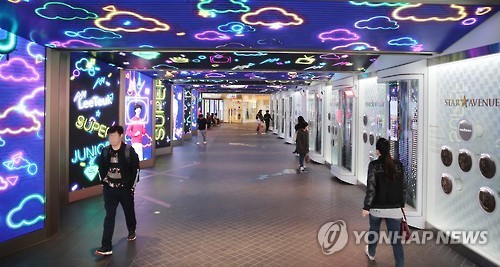Most of South Korea's major firms may be held hostage by China in the latter's attempt to express its anger over Seoul's planned deployment of a US missile defense system, due largely to their growing sales in China, a report suggested Wednesday.
According to the report by CEO Score, a market research firm here, some South Korean conglomerates had more than half of their annual sales come from China over the past few years, meaning a sudden drop in their sales in China could be detrimental to their overall business.
 |
A duty-free shop in Seoul is nearly deserted on March 13, 2017, amid China's continued de facto ban on tours to the country. (Yonhap) |
Beijing has already been taking a series of measures banning South Korean imports and limiting business operations of some South Korean firms there, in what is widely seen as its retaliation against South Korea for the planned deployment of the Terminal High Altitude Area Defense system.
So far, China's anger has largely been directed at the Chinese operation of South Korean retail giant Lotte Group, which has agreed to give up its golf course in South Korea's southeastern town of Seongju so it can become the home of the new US air defense system in a land-swap deal.
Market observers here, however, have noted China's retaliation may target others as well.
Wednesday's report showed how much more damaging such retaliatory measures could be to many South Korean firms.
LG Display, the world's largest supplier of LCD panels, had its sales in China account for 68.3 percent of its annual sales in 2015 and 68.6 percent in the first nine months of 2016, according to CEO Score.
Orion, a major F&B firm here, also had more than half of its overall sales come from China in 2015 and again last year.
The combined sales of 70 major South Korean companies in China came to 86.4 trillion won ($75.2 billion) in the first nine months of 2016, accounting for 18.1 percent of their overall sales over the cited period, the report said. (Yonhap)






![[Exclusive] Hyundai Mobis eyes closer ties with BYD](http://res.heraldm.com/phpwas/restmb_idxmake.php?idx=644&simg=/content/image/2024/11/25/20241125050044_0.jpg)
![[Herald Interview] 'Trump will use tariffs as first line of defense for American manufacturing'](http://res.heraldm.com/phpwas/restmb_idxmake.php?idx=644&simg=/content/image/2024/11/26/20241126050017_0.jpg)
![[Herald Review] 'Gangnam B-Side' combines social realism with masterful suspense, performance](http://res.heraldm.com/phpwas/restmb_idxmake.php?idx=644&simg=/content/image/2024/11/25/20241125050072_0.jpg)